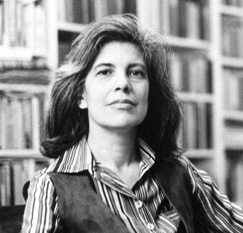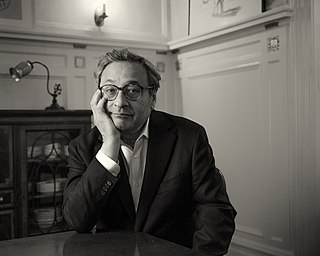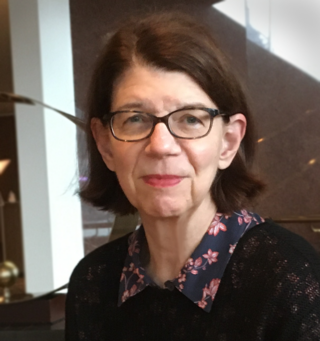Related Research Articles

Susan Lee Sontag was an American writer, critic, and public intellectual. She mostly wrote essays, but also published novels; she published her first major work, the essay "Notes on 'Camp' ", in 1964. Her best-known works include the critical works Against Interpretation (1966), On Photography (1977), Illness as Metaphor (1978) and Regarding the Pain of Others (2003), as well as the fictional works The Way We Live Now (1986), The Volcano Lover (1992), and In America (1999).

Azar Nafisi is an Iranian-American writer and professor of English literature. Born in Tehran, Iran, she has resided in the United States since 1997 and became a U.S. citizen in 2008.
Louis Menand is an American critic, essayist, and professor who wrote the Pulitzer-winning book The Metaphysical Club (2001), an intellectual and cultural history of late 19th- and early 20th-century America.

Jonathan Edward Schell was an American reporter and writer whose work primarily dealt with American foreign policy from the Vietnam War to the War on Terror, as well as the threat posed by nuclear weapons and support for nuclear disarmament.

David Rieff is an American nonfiction writer and policy analyst. His books have focused on issues of immigration, international conflict, and humanitarianism.
Richard Warrington Baldwin Lewis was an American literary scholar and critic. He gained a wider reputation when he won a 1976 Pulitzer Prize for Biography or Autobiography, the first National Book Critics Circle Award for nonfiction, and a Bancroft Prize for his biography of Edith Wharton. The New York Times called the book "a beautifully wrought, rounded portrait of the whole woman, including the part of her that remained in shade during her life" and said that the "expansive, elegant biography ... can stand as literature, if nothing else."
Jonathan Lear is an American philosopher and psychoanalyst. He is the John U. Nef Distinguished Service Professor in the Committee on Social Thought at the University of Chicago and served as the Roman Family Director of the Neubauer Collegium for Culture and Society from 2014 to 2022.

Timothy David Snyder is an American historian specializing in the history of Central and Eastern Europe, the Soviet Union, and the Holocaust. He is the Richard C. Levin Professor of History at Yale University and a permanent fellow at the Institute for Human Sciences in Vienna.

David Brion Davis was an American intellectual and cultural historian, and a leading authority on slavery and abolition in the Western world. He was a Sterling Professor of History at Yale University, and founder and director of Yale's Gilder Lehrman Center for the Study of Slavery, Resistance, and Abolition.

Odd Arne Westad FBA is a Norwegian historian specializing in the Cold War and contemporary East Asian history. He is the Elihu Professor of History and Global Affairs at Yale University, where he teaches in the Yale History Department and in the Jackson School of Global Affairs. Previously, Westad held the S.T. Lee Chair of US-Asia Relations at Harvard University, teaching in the John F. Kennedy School of Government. He has also taught at the London School of Economics, where he served as director of LSE IDEAS. In the spring semester 2019 Westad was Boeing Company Chair in International Relations at Schwarzman College, Tsinghua University.

David D. Cole is the National Legal Director of the American Civil Liberties Union (ACLU). Before joining the ACLU in July 2016, Cole was the Hon. George J. Mitchell Professor in Law and Public Policy at the Georgetown University Law Center from March 2014 through December 2016. He has published in various legal fields including constitutional law, national security, criminal justice, civil rights, and law and literature. Cole has litigated several significant First Amendment cases in the Supreme Court of the United States, as well a number of influential cases concerning civil rights and national security. He is also a legal correspondent to several mainstream media outlets and publications.
Alice Yaeger Kaplan is an American literary critic, translator, historian, and educator. She is Sterling Professor of French and former Director of the Whitney Humanities Center at Yale University.

Michael David Warner is an American literary critic, social theorist, and Seymour H. Knox Professor of English Literature and American Studies at Yale University. He also writes for Artforum, The Nation, The Advocate, and The Village Voice. He is the author of Publics and Counterpublics, The Trouble with Normal: Sex, Politics, and the Ethics of Queer Life, The English Literatures of America, 1500–1800, Fear of a Queer Planet, and The Letters of the Republic. He edited The Portable Walt Whitman and American Sermons: The Pilgrims to Martin Luther King, Jr.
William Edward Leuchtenburg was an American historian who was the William Rand Kenan Jr. Professor of History at the University of North Carolina at Chapel Hill, and a leading scholar of the life and career of Franklin Delano Roosevelt.
Bernard MacGregor Walker Knox was an English classicist, author, and critic who became an American citizen. He was the first director of the Center for Hellenic Studies. In 1992 the National Endowment for the Humanities selected Knox for the Jefferson Lecture, the U.S. federal government's highest honor for achievement in the humanities.
Perry Meisel is an American writer and former Professor of English at New York University. He taught at New York University for over forty years prior to his retirement in 2016 and has written on literature, music, psychoanalysis, theory, and culture since the 1970s. His articles have appeared in The Village Voice, The New York Times Book Review, Partisan Review, October, The Nation, The Atlantic, and many other publications. His books include The Myth of Popular Culture from Dante to Dylan, The Literary Freud, The Cowboy and the Dandy, The Myth of the Modern, The Absent Father, and Thomas Hardy: The Return of the Repressed. He is co-editor, with Haun Saussy, of Ferdinand de Saussure's Course in General Linguistics, and co-editor, with Walter Kendrick, of Bloomsbury/Freud: The Letters of James and Alix Strachey, 1924–25. He is also editor of Freud: A Collection of Critical Essays. He received his B.A., M. Phil, and Ph.D. from Yale.

Andrew H. Delbanco is an American writer and professor. He is the Alexander Hamilton Professor of American Studies at Columbia University and the president of the Teagle Foundation.
James Davison Hunter is an American sociologist and originator of the term "culture war" in his 1991 book Culture Wars: The Struggle to Define America. Hunter is the LaBrosse-Levinson Distinguished Professor of Religion, Culture, and Social Theory at the University of Virginia and the founder and executive director of the university's Institute for Advanced Studies in Culture. He is also a senior fellow at the Trinity Forum.

Martha Bayles is an American critic, author, and college professor. Her work focuses on the arts, popular media, cultural policy, and U.S. public diplomacy. She has written for publications such as the Wall Street Journal, the Boston Globe, the Claremont Review of Books, and the Weekly Standard. Bayles' published books include Hole in Our Soul: The Loss of Beauty and Meaning in American Popular Music in 1994, and Through a Screen Darkly: Popular Culture, Public Diplomacy, and America's Image Abroad in 2014. She has formerly taught at Harvard University and Claremont McKenna College, and is currently a professor of humanities at Boston College.

Joanne B. Freeman is a U.S. historian and tenured Professor of History and American Studies at Yale University. Freeman has published two books as well as articles and op-eds in newspapers including The New York Times, magazines such as The Atlantic and Slate. In 2005 she was rated one of the "Top Young Historians" in the U.S.
References
- 1 2 "U. professor questions modernity in newly published book, collection of essays". The Daily Targum. 2024-10-29. Retrieved 2025-01-30.
- ↑ Susan Sontag, endorsement for Jackson Lears, Something for Nothing: :Luck in America New York: Viking Press, 2003, p. ii.
- ↑ Conservative, The American; Caldwell, Christopher (2024-11-26). "A Student of the American Character". The American Conservative. Retrieved 2025-01-30.
- ↑ Cullen, Jim (2024-07-25). "REVIEW: The Iconoclast". Current. Retrieved 2025-01-30.
- 1 2 "T.J. Jackson Lears | American Academy of Arts and Sciences". www.amacad.org. 2025-01-30. Retrieved 2025-01-30.
- ↑ "Presidential Misconduct". Center on National Security. Retrieved 2025-01-30.
- ↑ Lears, Jackson (2019-05-04). "Art for Life's Sake: Craft and the Quest for Wholeness in American Culture". The Journal of Modern Craft. 12 (2): 161–172. doi:10.1080/17496772.2019.1620435. ISSN 1749-6772.